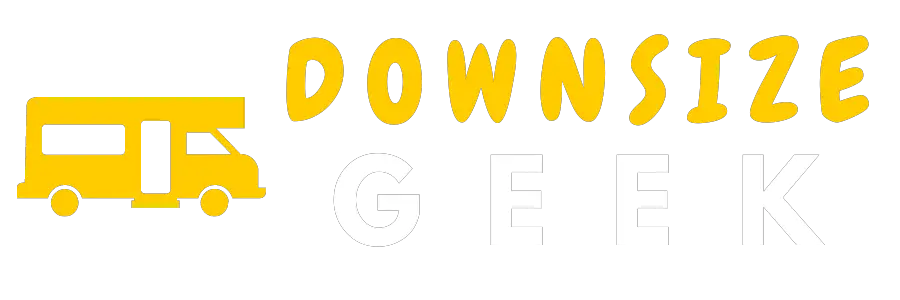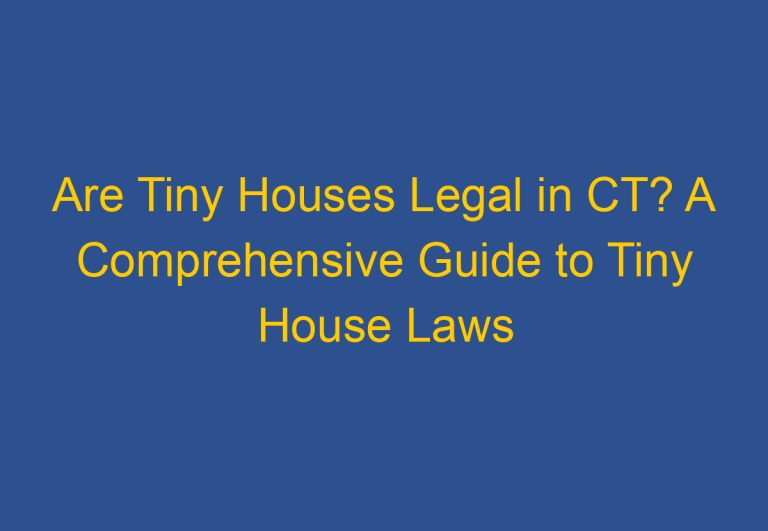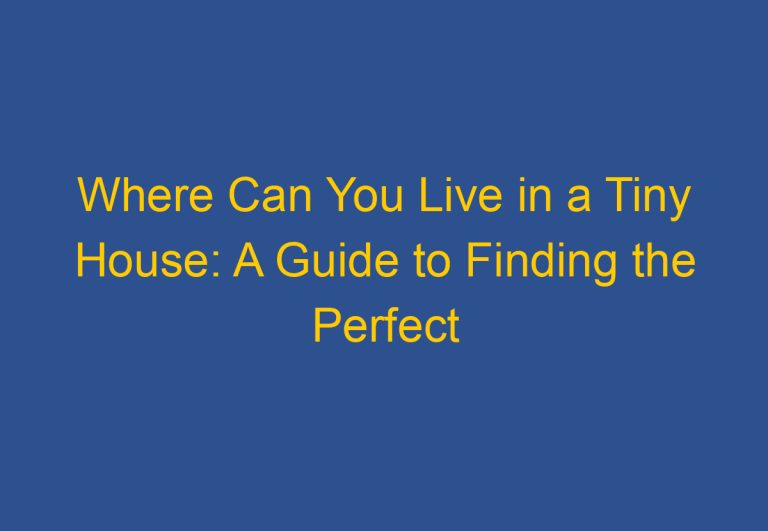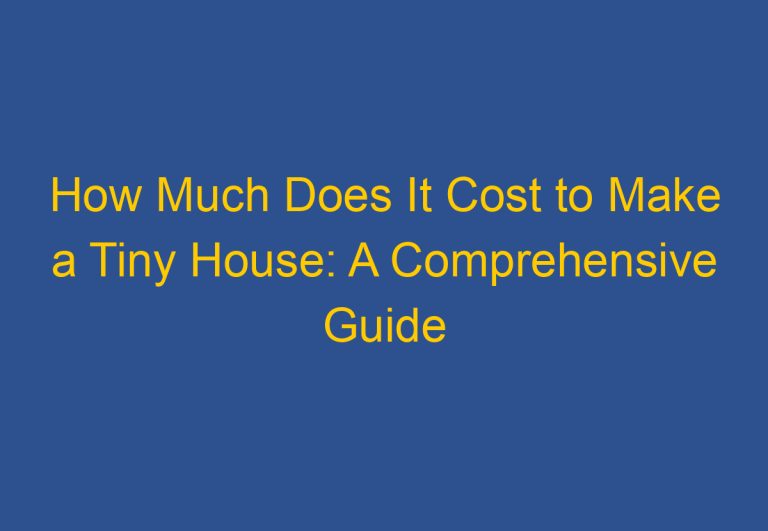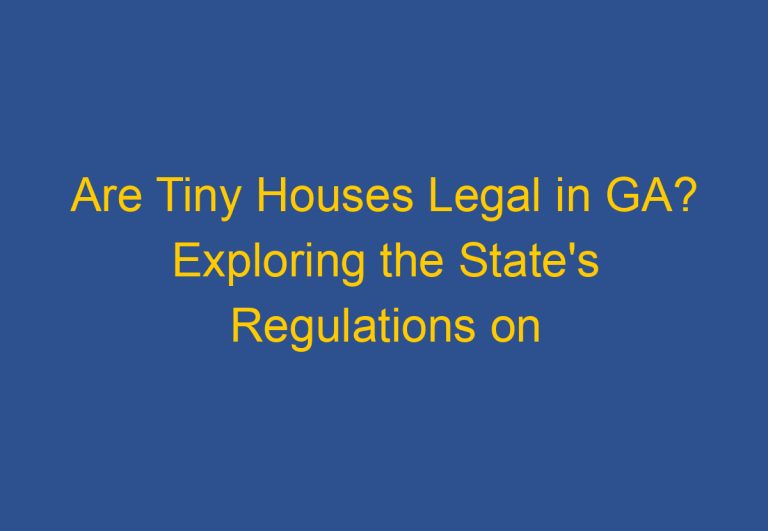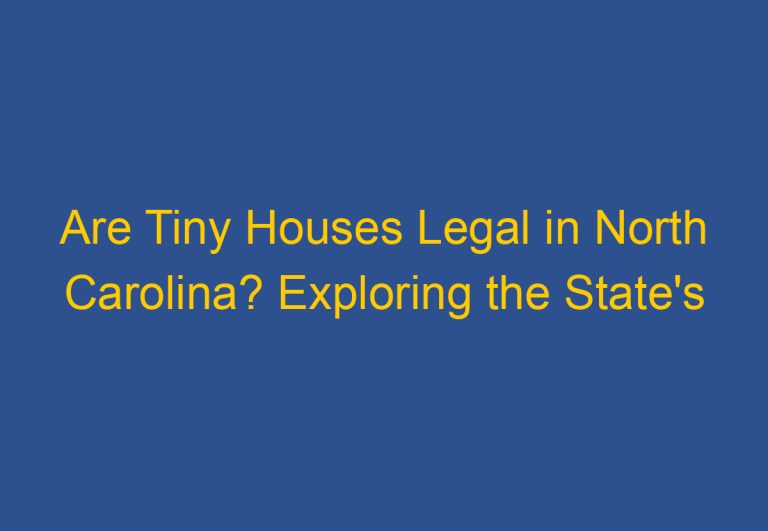Are Tiny Houses Legal in San Diego? A Comprehensive Guide to the City’s Zoning Laws
Tiny houses have become increasingly popular in recent years, offering a minimalist lifestyle and a more affordable way of living. However, many people wonder if these small homes are legal in their area. In San Diego, the answer is yes, but there are some regulations to follow.
According to the California Building Code, tiny homes can be used as accessory dwelling units (ADUs) and houses on wheels (THOWs) as long as they comply with certain regulations. In San Diego, the city council has approved the region’s first tiny house law to help solve the housing crisis. This law allows for the construction of tiny houses on wheels as long as they comply with the city’s building codes and safety regulations.
The tiny house movement has gained popularity in San Diego due to the high cost of living and the growing housing crisis. Many people are turning to tiny homes as a more affordable and sustainable way of living. However, it is important to note that not all areas in San Diego allow for tiny homes, and those interested in building one should do their research and obtain the necessary permits and approvals.
Legality and Regulations of Tiny Houses in San Diego
Zoning Laws and Development Standards
In San Diego, zoning laws and development standards regulate the placement of tiny houses. The City of San Diego allows tiny houses on wheels (THOWs) as long as they are parked on a property that already has a primary residence. Property owners must comply with all zoning laws and development standards when placing a tiny house on their property. The tiny house must be on a permanent foundation and connected to utilities, and it must meet all building codes and safety standards.
Accessory Dwelling Units (ADUs) and THOWs
The City of San Diego allows tiny houses to be used as accessory dwelling units (ADUs) on a property that already has a primary residence. ADUs are secondary housing units that are located on the same property as a primary residence. ADUs and THOWs must comply with all zoning laws and development standards in San Diego. Property owners must obtain a building permit and comply with all California Building Standards Code (CBSC) requirements.
Building Permits and California Building Code Compliance
Building permits are required for all tiny houses in San Diego, whether they are used as permanent dwellings or ADUs. Property owners must obtain a building permit and comply with all CBSC requirements. Tiny houses must meet all building codes and safety standards, including those related to plumbing, electrical, and mechanical systems. They must also be structurally sound and able to withstand natural disasters such as earthquakes.
In summary, tiny houses are legal in San Diego as long as they comply with all zoning laws, development standards, and building codes. Property owners must obtain a building permit and comply with all CBSC requirements. Tiny houses on wheels are allowed as long as they are parked on a property that already has a primary residence. They can be used as ADUs as long as they comply with all zoning laws and development standards.
Economic and Social Impacts of Tiny Houses
Affordable Housing and the Housing Crisis
Tiny houses have emerged as a possible solution to the affordable housing crisis that has been affecting many cities in the United States, including San Diego. With skyrocketing housing costs and limited affordable housing options, tiny houses offer a more affordable alternative to traditional homes. Tiny houses are often more affordable than traditional homes because of their smaller size, which means lower mortgage payments, lower property taxes, and lower utility bills.
Community Development and Local Economy
The development of tiny houses can also have positive impacts on the local economy. By creating more affordable housing options, tiny houses can attract low-income residents who might otherwise be priced out of the housing market. This can lead to increased economic activity and job growth in the local community. Additionally, tiny houses can be built using local materials and labor, which can further stimulate the local economy.
Environmental Considerations and Lifestyle
Tiny houses are often built using sustainable and eco-friendly materials, which can help reduce their environmental impact. Additionally, tiny houses promote a simpler and more minimalist lifestyle, which can have positive impacts on mental health and overall well-being. Tiny houses can also be designed to be accessible to senior citizens and medical caregivers, which can help address some of the housing challenges faced by these groups.
In conclusion, tiny houses have the potential to address many of the economic and social challenges faced by San Diego and other cities. However, it is important to carefully consider the potential impacts of tiny houses and to ensure that they are developed in a way that is sustainable, affordable, and equitable for all members of the community.
Frequently Asked Questions
What are the zoning regulations for tiny houses in San Diego?
Zoning regulations for tiny houses in San Diego vary depending on whether the house is on wheels or a permanent structure. In general, tiny houses on wheels are considered recreational vehicles and may be parked on private property for up to 72 hours without a permit. However, if the tiny house on wheels is intended for permanent residence, it must comply with the California Building Code and may require a permit. Permanent tiny houses must also comply with zoning regulations, including minimum lot size and setback requirements.
Can you legally reside in a tiny house on wheels within San Diego city limits?
Yes, it is legal to reside in a tiny house on wheels within San Diego city limits, as long as the house complies with the California Building Code and zoning regulations. However, the house must be parked on private property and may not be used as a primary residence.
What is the minimum house size requirement for permanent structures in San Diego County?
The minimum house size requirement for permanent structures in San Diego County is 150 square feet. However, this requirement may be waived for tiny houses that are used as accessory dwelling units (ADUs) and comply with the California Building Code and zoning regulations.
Are there designated tiny home communities in the San Diego area?
Yes, there are designated tiny home communities in the San Diego area. These communities are typically located on private property and may require membership or rental fees. However, it is important to check with each community to ensure that their regulations and zoning requirements are met.
What permits are needed to build a tiny house in San Diego?
The permits needed to build a tiny house in San Diego depend on whether the house is on wheels or a permanent structure. Tiny houses on wheels may require a permit if they are intended for permanent residence, while permanent structures require a building permit. Additionally, zoning permits may be required for both types of houses.
Is it permissible to live in a trailer on private property in San Diego?
Yes, it is permissible to live in a trailer on private property in San Diego, as long as the trailer complies with the California Building Code and zoning regulations. However, the trailer must be parked on private property and may not be used as a primary residence.
